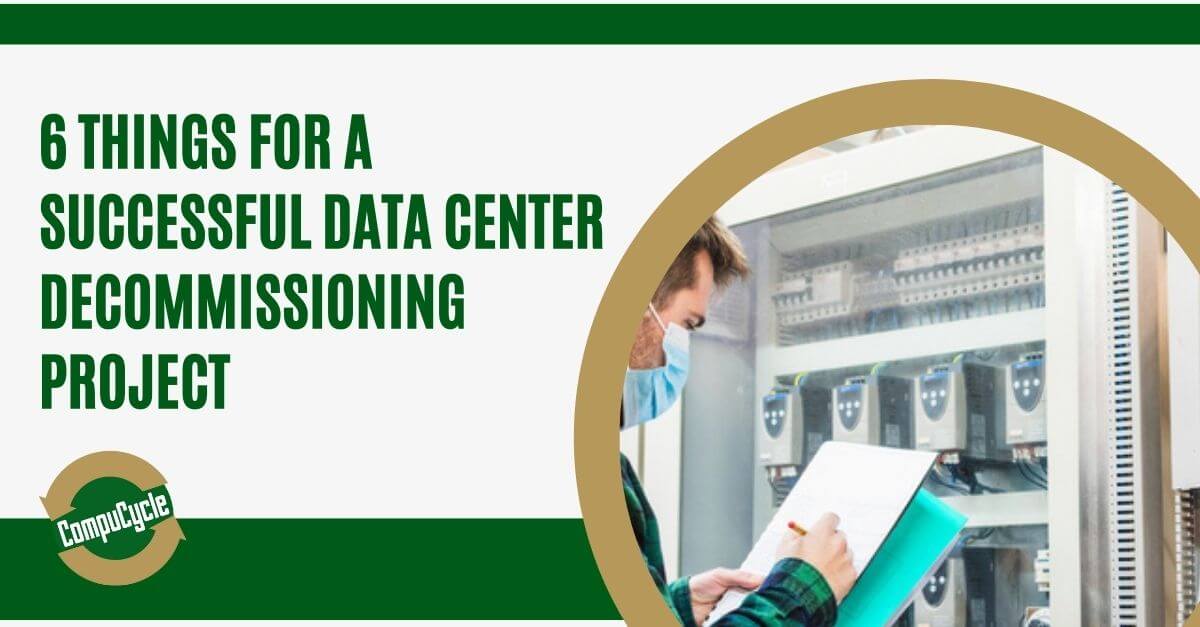
When you are constructing a data center, you are not at risk of disrupting a business. However, data center decommissioning poses that threat, making it much harder. A data center decommissioning project is complicated and complex, and you have to make sure you have a proper and viable data center decommission project plan that you can follow for successful dismantling.

You need electricians to safely shut down the system, a crew to handle the cooling system, and a specialized team that can take care of the recycling of the dismantled electronics. The trend of moving away from on-premises data centers and migrating to the cloud is gathering pace, causing more and more organizations to require the perfect data center decommission project plan. Here are some key considerations, 7 S’s, that can enable you to smooth-sail through the process:
- Security
- Size
- Sensitivity
- Sophistication
- Sequence
- Saleability
- Software
Let us dive into the steps that should constitute your data center decommissioning project.
1. Choose the Right Vendor
It is quite possible that you and your teams have the capacity to take on the data center decommission project plan by themselves. However, saving a few dollars come along with the HIPPA liability. Any equipment and IT assets that you dismantle during date center decommissioning have significant potential value as well. R2 regulations require refurbishing and proper testing of the electronics before you can put them up for resale.
Therefore, you need to choose an R2 certified vendor to be involved in your data center decommission project plan while you supervise it. Make sure they are experienced and ask to check their certification documents. A highly capable and specialized company in this regard is CompuCycle. They can take care of secure data sanitization and shredding of your electronics following environmentally safe protocols.
2. Inventory Data Center Assets
The first step needed for successful data center decommissioning is a complete and detailed inventory of all the assets. A prerequisite of this step is efficient data center asset management. You need to be aware of the data and applications that each device contains and the equipment you have. All this information should be recorded and present in a configuration management database (CMDB) before the data center decommissioning is initiated.
3. Security
Data centers are full of sensitive and confidential data. This usually prompts the managers to have a security plan for them that can include performing background checks on people entering them and employing cybersecurity tools to fend off cyber threats. Whatever the considerations of your data center security plan are, make sure they are checked and taken care of.
4. Power off and Removal 
Physical and logical storage of data prevents you from mistakenly retiring items that are hosting middleware that is to remain in production. You cannot afford to unplug first and realize later that you powered down the wrong device. Make sure to remove assets from the facility after at least 24 hours of powering them off, as it allows for people to make complaints if their applications cease to work, and you can power the respective device back on.
5. Packing and Shipment
This step will be taken care of by your e-recycling vendor. They will package all the equipment carefully and load them on their truck before shipping it off to their data destruction and electronic shredding facility. A specialized e-recycling company has an efficient chain of custody and operates in a secure manner. It ensures complete data destruction through NIST media sanitization compliant processes and refurbishes and tests the reusable assets before reselling them in the market. CompuCycle is extremely responsive on all these accounts.
6. Testing, Shredding and Reselling
Again, this step of the data center decommissioning will be taken care of by your e-recycling vendor. An R2 certified and responsible vendor cannot just sell electronic devices on E-bay. They have to refurbish and test the devices according to the R2 guidelines and prove to an auditor that they did so. They also have to document and present the testing phase, including which processes were used in it.
A good vendor shreds the assets that are not reusable and disposes of them in an environmentally safe manner. CompuCycle has a state-of-the-art shredder that does not require IT assets to go through any other process. The company also has a huge network of buyers that are ready to purchase refurbished equipment. This means you can get high value against the assets that you remove during your data center decommissioning process.
Recent Articles
Secure Electronics Disposal in Houston: Why the City’s Largest Industries Trust CompuCycle
When a major healthcare system decommissions thousands of laptops, or an oil and gas company retires an entire data center, one question comes up again and again: What happens to all that data — and…
Read MoreCompuCycle Executives Join R2 TAC and e-Stewards Leadership Council to Advance ITAD Standards
Houston-based ITAD provider deepens its industry influence through active participation in standard-setting committees. As corporate ITAD needs evolve alongside stricter compliance and ESG requirements, CompuCycle continues to lead the way—this time by contributing directly to…
Read MoreI’m Just a Computer: A Journey Through ITAD Recycling
Meet Chip the Computer – he’s about to take you on an unforgettable journey through the world of IT Asset Disposition (ITAD). Buckle up for an adventure that’s both educational and entertaining! Chapter 1: “Hello,…
Read MoreIs There a Wrong Way to Recycle Electronics?
Most people agree that recycling electronics is the right thing to do. It prevents hazardous waste from entering landfills, supports sustainability goals, and allows for the recovery of valuable materials. But what many businesses don’t…
Read More


